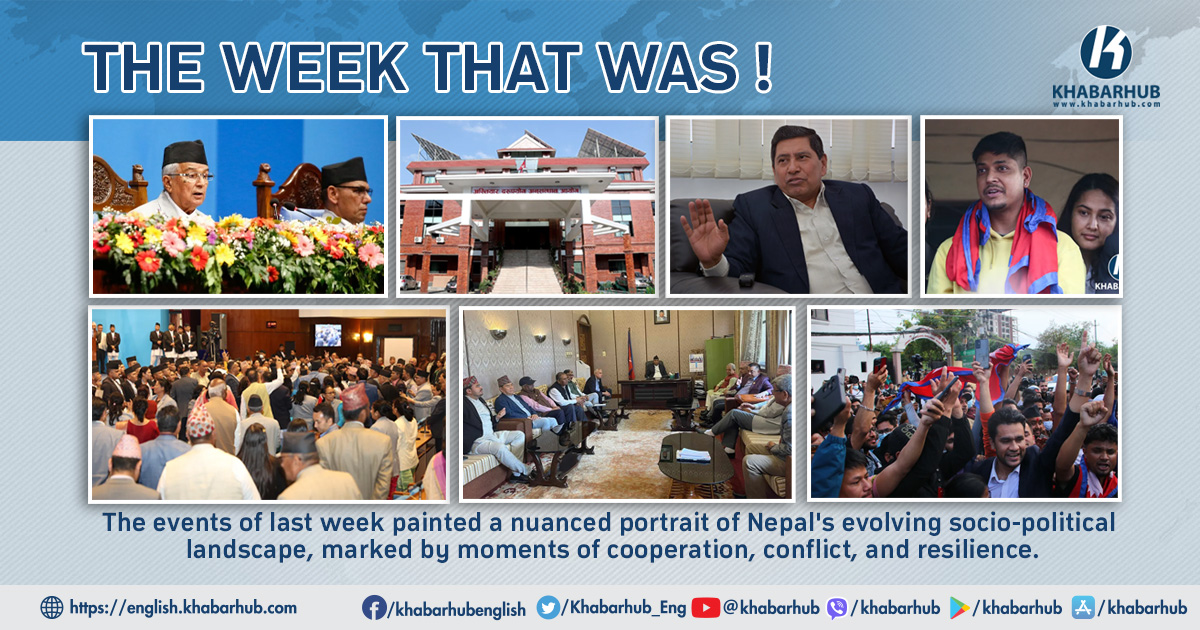KATHMANDU: Last week marked a significant moment in Nepal’s political, legal, and social landscape as the government unveiled its policies and programs for the fiscal year 2024/25.
President Ram Chandra Poudel took center stage during a joint session of the upper and lower houses of parliament, presenting an agenda that would shape the nation’s trajectory in the coming year.
Against the backdrop of this significant announcement, a series of events unfolded, each contributing to the intricate tapestry of Nepal’s contemporary narrative.
One of the foremost developments was the agreement reached between the Nepali Congress (NC), the main opposition party, and key parties within the ruling coalition to form a parliamentary probe committee on cooperatives fraud issue.
This committee, tasked with investigating cooperatives-related fraud, emerged as a response to mounting concerns over financial improprieties within the country.
A meeting convened at the Prime Minister’s residence in Baluwatar saw representatives from the NC, CPN-UML, CPN-Maoist Center, and Rastriya Swatantra Party (RSP) deliberating on the terms of reference (TOR) under the coordination of Law Minister Padam Giri.
Meanwhile, Deputy Prime Minister and Foreign Minister Narayankaji Shrestha emphasized the importance of dialogue and diplomacy in addressing issues with neighboring India.
The consensus reached during this meeting underscored a rare moment of bipartisan cooperation, signaling a commitment to addressing corruption and restoring public trust in governance institutions.
Last week also saw spirit of cooperation overshadowed by political discord, as evidenced by a physical altercation that erupted during a parliamentary meeting between lawmakers from the Nepali Congress and the CPN-UML.
The disagreement, sparked by a rift between UML Chair KP Sharma Oli and Nepali Congress Vice-President Dhan Raj Gurung, escalated into chaos within the assembly hall.
Speaker Dev Raj Ghimire was compelled to adjourn the meeting as tensions flared and tempers flared.
The incident highlighted the fragility of political consensus and underscored the deep-rooted divisions that continue to permeate Nepal’s political landscape.
Amidst the political turbulence, the Janata Samajwadi Party (JSP) Nepal announced its decision to withdraw support from the Prime Minister Pushpa Kamal Dahal-led government.
Party Chairman Upendra Yadav tendered his resignation, signaling a rupture within the ruling coalition and casting a shadow of uncertainty over the future of governance.
The withdrawal of support was swiftly followed by a similar move from the CPN (Maoist Center), which decided to withdraw its support from the Madhesh provincial government.
The resignation of two ministers representing the party further exacerbated the political upheaval, prompting speculation about the stability of the provincial administration.
Against this backdrop of political volatility, the Commission for the Investigation of Abuse of Authority (CIAA) filed corruption charges against former officials implicated in the security printing press scam.
Former directors Bikal Poudel and Safal Shrestha, along with Navin Kumar Pokharel, an employee at the Ministry of Forest and Environment, were accused of embezzling funds worth over Rs 470 million through fraudulent procurement practices.
The charges underscored the government’s commitment to combating graft and holding accountable those responsible for undermining public trust in state institutions.
As Nepal grappled with the complexities of governance, politics, and justice, its tourism sector experienced a surge in visitors, with the Annapurna circuit attracting a record 177,000 tourists over the past 10 months.
In another significant policy shift, the government imposed a ban on teachers of community schools from joining political parties, signaling a concerted effort to depoliticize the education sector.
President Ram Chandra Poudel announced this measure during the unveiling of the government’s policies and programs for the fiscal year 2024/25, emphasizing the need to ensure the impartiality and integrity of the education system.
The decision, while welcomed by some as a step towards strengthening democratic norms, sparked debate and controversy among educators and political stakeholders alike.
Meanwhile, Deputy Prime Minister and Foreign Minister Narayankaji Shrestha emphasized the importance of dialogue and diplomacy in addressing issues with neighboring India.
Speaking during a lecture series initiated by the Ministry of Foreign Affairs, Shrestha underscored the longstanding history of mutual friendship and cooperation between Nepal and India.
He stressed the need for constructive engagement and peaceful resolution of disputes, highlighting the cultural affinity and multifaceted connections that bind the two nations.
As the government forged ahead with its policy agenda, and as citizens grappled with the complexities of justice and governance, Nepal stood at a crossroads, poised to navigate the challenges and opportunities that lay ahead on its path towards progress and prosperity.
In a legal development that captured national attention, the Patan High Court granted a clean chit to cricketer Sandeep Lamichhane in a high-profile rape case.
The court overturned the previous verdict issued by the Kathmandu District Court, absolving Lamichhane of all charges and paving the way for his eligibility to join Nepal’s squad for the upcoming ICC T20 World Cup.
The decision marked a significant victory for the athlete and underscored the importance of due process and judicial impartiality in upholding the rule of law.
As Nepal grappled with the complexities of governance, politics, and justice, its tourism sector experienced a surge in visitors, with the Annapurna circuit attracting a record 177,000 tourists over the past 10 months.
This influx of tourists, according to officials, underscored the region’s popularity as a premier trekking destination and its economic significance for the country.
Against the backdrop of breathtaking landscapes and cultural heritage, tourists from around the world flocked to Nepal, contributing to its vibrant tourism industry.
In conclusion, the events of last week painted a nuanced portrait of Nepal’s evolving socio-political landscape, marked by moments of cooperation, conflict, and resilience.
As the government forged ahead with its policy agenda, and as citizens grappled with the complexities of justice and governance, Nepal stood at a crossroads, poised to navigate the challenges and opportunities that lay ahead on its path towards progress and prosperity.









Comment